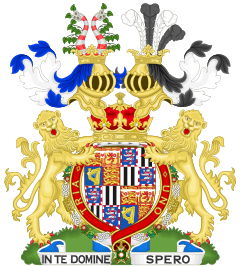Marquess of Carisbrooke
| Marquessate of Carisbrooke | |
|---|---|
 Quarterly: 1st and 4th grand quarters, the Royal Arms differenced by a label of 3 points Argent, the centre point charged with a heart Gules and each of the other points with a rose of the last, barbed and seeded proper; 2nd and 3rd grand quarters, quarterly 1st and 4th Azure a lion rampant double-queued barry of ten Argent and Gules, armed and langued of the last,crowned Or within a bordure company of the second and third, 2nd and 3rd Argent two pallets Sable. | |
| Creation date | 7 November 1917 |
| Created by | King George V |
| Peerage | Peerage of the United Kingdom |
| First holder | Alexander Mountbatten |
| Last holder | Alexander Mountbatten, 1st Marquess of Carisbrooke |
| Remainder to | 1st Marquess's heirs male of the body lawfully begotten |
| Subsidiary titles | Earl of Berkhampstead Viscount Launceston |
| Status | Extinct |
| Extinction date | 23 February 1960 |
Marquess of Carisbrooke was a title in the Peerage of the United Kingdom. It was created in 1917 for Alexander Mountbatten (formerly Prince Alexander of Battenberg),[1] eldest son of Princess Beatrice of the United Kingdom (youngest daughter of Queen Victoria) and Prince Henry of Battenberg. He was made Viscount Launceston, in the County of Cornwall, and Earl of Berkhampstead at the same time, also in the Peerage of the United Kingdom.[1]
Along with other German-surnamed relations of the British royal family, Alexander also changed his surname at that time, to Mountbatten. The titles became extinct upon Lord Carisbrooke's death in 1960, as he had no sons.
Carisbrooke Castle was the residence of Prince Henry and Princess Beatrice as Governor of the Isle of Wight. The title of Marquess of Berkhampstead had previously been conferred with the Dukedom of Cumberland on Prince William Augustus, son of King George II, in 1726. The title of Viscount Launceston had previously been conferred with the Dukedom of Edinburgh on Prince Frederick Louis, later Prince of Wales, also in 1726.
Marquess of Carisbrooke (1917)
References
- ^ a b "No. 30374". The London Gazette. 9 November 1917. p. 11594.
Attribution
- Hesilrige, Arthur G. M. (1921). Debrett's Peerage and Titles of courtesy. London: Dean & son, limited. p. 172.
